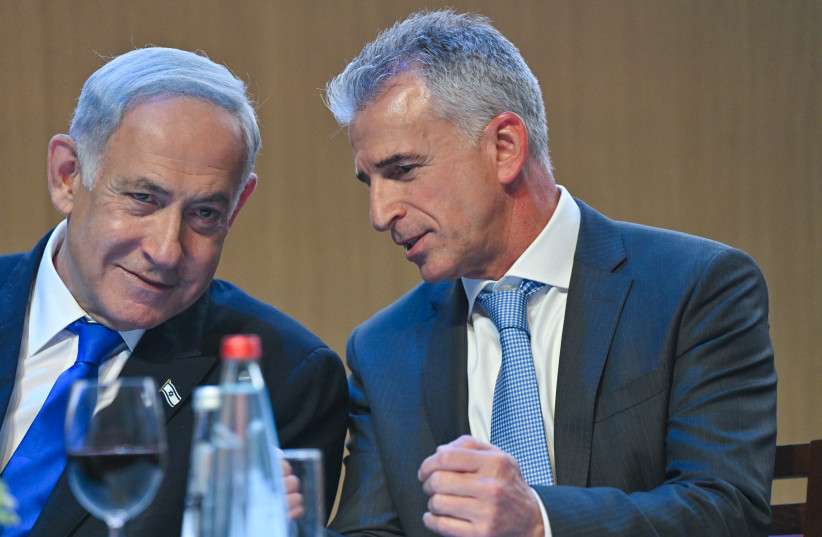What is Mossad chief David Barnea’s role in hostage negotiations?
What has been the role of Mossad Director David Barnea in the hostage negotiations with Hamas and the many third-party intermediaries?
Answering that question is far from easy, because Barnea eschews media attention compared with his predecessor, Yossi Cohen.
He has gone especially dark regarding public appearances since the war started on October 7.
But others have not been shy about his role, with Prime Minister Benjamin Netanyahu publicly discussing his travels to negotiate over Israeli hostages with Hamas in Doha, Cairo, and Paris.

Netanyahu also publicly said he had ordered Barnea to assassinate Hamas leaders across the globe wherever they might be.
Likewise, Defense Minister Yoav Gallant has made a point of issuing press releases and photos about his meetings with Barnea.
Other members of the war cabinet, such as National Unity chairman Benny Gantz, have not commented as much on Barnea in public, but they have publicly and privately tried to influence the position he would take in hostage negotiations with Hamas.
Even National Security Minister Itamar Ben-Gvir has publicly commented on Barnea, demanding he not be sent to Paris for further hostage negotiations. Ben-Gvir wants to kill Hamas’s leader as the first priority.
What is the Mossad chief’s impact?
So why do so many people publicly “out” the Mossad chief’s activities, which are supposed to be secret, and what is Barnea’s actual impact?
From various sources and foreign reports, The Jerusalem Post has learned that Barnea is no mere messenger but a serious operator in his own right. He has discretion on some issues and often has made key recommendations or taken key positions that have influenced the ultimate course of hostage negotiations.
Part of what has made Barnea crucial is the high respect accorded to him by all of the key players, including Qatar’s leaders and intelligence officials, Jordan’s and Egypt’s leaders, CIA Director William Burns, and, of course, Netanyahu.
The Post understands that Qatar’s hold over Hamas is threefold: It directly hosts some of Hamas’s top leadership; it hosts some of the family members of Hamas’s leaders who are still in Gaza; and its banks have about 80% of the terrorist group’s funds.
This has meant that Barnea has put even more energy into that relationship than any other.
Paradoxically, the Post has learned that part of what has earned Barnea such high credibility with all of the parties is his reputation for assassination operations and for his loud opposition to allowing Qatar to provide funds to Hamas both as Mossad chief and as deputy chief.
Because of these traits, Qatar’s leaders know that when he offers them something from Israel, it is real, because he is not just a friendly negotiator smitten by them or that he is trying to spin them.
They know neither side is going to be able to pull any tricks on him, and that they must always put their real cards on the table.
This means that Barnea has the ability to be in touch with a variety of key Qatar officials at any time relatively instantaneously.
Incidentally, this was exactly the reason that Netanyahu picked Barnea, who competed with former Mossad deputy director Ehud Lavi for the top spymaster role.
Early on, Barnea and Burns had significant professional respect for each other, but over the two and half years that the two have served as counterparts, and especially since October 7, they have become deeper and closer personal friends with the utmost reciprocal trust.
Some critical points when Barnea had a decisive role were when he was the first to suggest an initial hostage exchange for 50 hostages.
Gallant, IDF Chief of Staff Lt.-Gen. Herzi Halevi, and Shin Bet (Israel Security Agency) Director Ronen Bar were all against such an offer early on (they later supported it). But crucially, Netanyahu’s close ally Ron Dermer was in favor, Shas chairman Arye Deri, Gantz, and his National Unity colleague Gadi Eisenkot were in favor.
Twice during the week when that initial hostage deal was playing out and Hamas started to try to play games, Barnea sent unmistakable messages to Qatar and Hamas that he would blow up the deal if they tried to switch what they were “giving” to Israel to be male hostages and dead bodies instead of the agreed-upon female hostages.
Barnea’s strong messaging got the deal back on track for several days and also cut off the deal once Hamas tried to see if he and Israel were bluffing.
The Mossad chief also always drafts the final text of any offers to Qatar and Hamas.
How does this square with the image of Netanyahu, Gallant, Gantz, and Eisenkot fighting publicly over the terms of hostage negotiations and for control of what Barnea does?
Gantz and Eisenkot said publicly or privately that they believed a hostage deal could have been achieved almost a month ago, but that Netanyahu stopped it.
The Post has been told that behind the scenes, all of these politicians’ positions are closer than what they imply in public when they are playing to their different bases.
Of course, Barnea still is not a free agent. He does take directives from the war cabinet.
So, this means Barnea is neither completely independent, nor is he a mere puppet in the hands of policy-makers. Rather, he is an implementer of policy, but one who has such a level of trust with all the key parties that he himself has and can influence the course of negotiations.





Comments are closed.